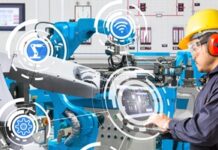
Getting back to work in busy buildings is a real challenge for businesses. But technology can provide vital support. In this blog, we explore how cutting-edge AI-powered cameras can protect workers, customers, visitors, and businesses themselves.
Normal daily life involves a lot of people moving around the inside of buildings. In bustling transport hubs, busy shopping centers, office blocks and warehouses, people are constantly moving past each other and between rooms and floors. But for the moment, this way of life has been forced to a halt – and understandably so. Within an enclosed space, there is a greater chance of transmission of illness. So to restrict transmission, businesses must also control the movement of people through very busy buildings.
The challenge today is how to do this as efficiently as possible, without affecting business interests. As we adjust to a new way of life, businesses must embrace innovative ways to optimize the density and flow of people through their premises, to protect workers, customers and visitors, while also protecting their businesses. The good news is, AI-powered video technology can support businesses of all sizes in this endeavor.
Protecting people and businesses with AI video
Intelligent video cameras, such as those within Hikvision’s Flow Control Solution, use people-counting technology coupled with dynamic digital signage to display how many people are entering and leaving a building or indoor area. The cameras feature highly accurate 3D binocular vision and deep learning algorithms to accurately count the number of people flowing through, even in the busiest sites with multiple entrances and exits.
The same cameras can also support social distancing in areas where crowds and standing in line is unavoidable. When the camera identifies that people are standing closer than the pre-determined threshold, it will trigger an alarm. The cameras can also be linked to digital signage, to display a visual notice.
For even greater reassurance, businesses can add in thermal and mask-detection camera technology, to help ensure people are safe to enter a location in the first place. Hikvision’s AI-powered cameras can intelligently identify whether someone is wearing a mask, while also effectively checking their skin temperatures. Equipped with this information, staff can then take appropriate action to reduce the risk of viral spread.
Putting the technology into practice
At a time when it’s incredibly hard for businesses to balance profitability with safety, we know, from the projects that we’re working on, that AI-powered video can offer business value.
Hikvision technology enables people managing office blocks, warehouses and supermarkets to accurately count everyone that enters and leaves the premises, to ensure they never exceed safe capacity. This data can also be linked to access control solutions, to physically prevent people from entering until it is safe to do so. Retailers, especially, can make use of digital signage to display how many people are in a store, so that customers understand why they may need to wait in line. Indeed, in retail – where it’s normal for people to wait at checkouts or crowd together in narrow aisles – making use of a Hikvision dual-lens camera can help businesses to maintain vital social distancing rules.
Meanwhile, in indoor transport hubs – where people are not only gathering, but travelling on to new locations – adding in thermal screening and mask detection is especially valuable. Safe building capacity can be managed, while any travelers that may show signs of a raised temperature or who are not wearing masks can be informed. Technology such as Hikvision’s can essentially help businesses to reopen as safely and profitably as possible.
Get the full back-to-business story
However, choosing the right technology is only one part of the back-to-business story.
Businesses should also be aware of the compliance, legal and HR requirements when installing and using this technology. And the technology must be effectively and expertly installed, to ensure it achieves its full potential.











